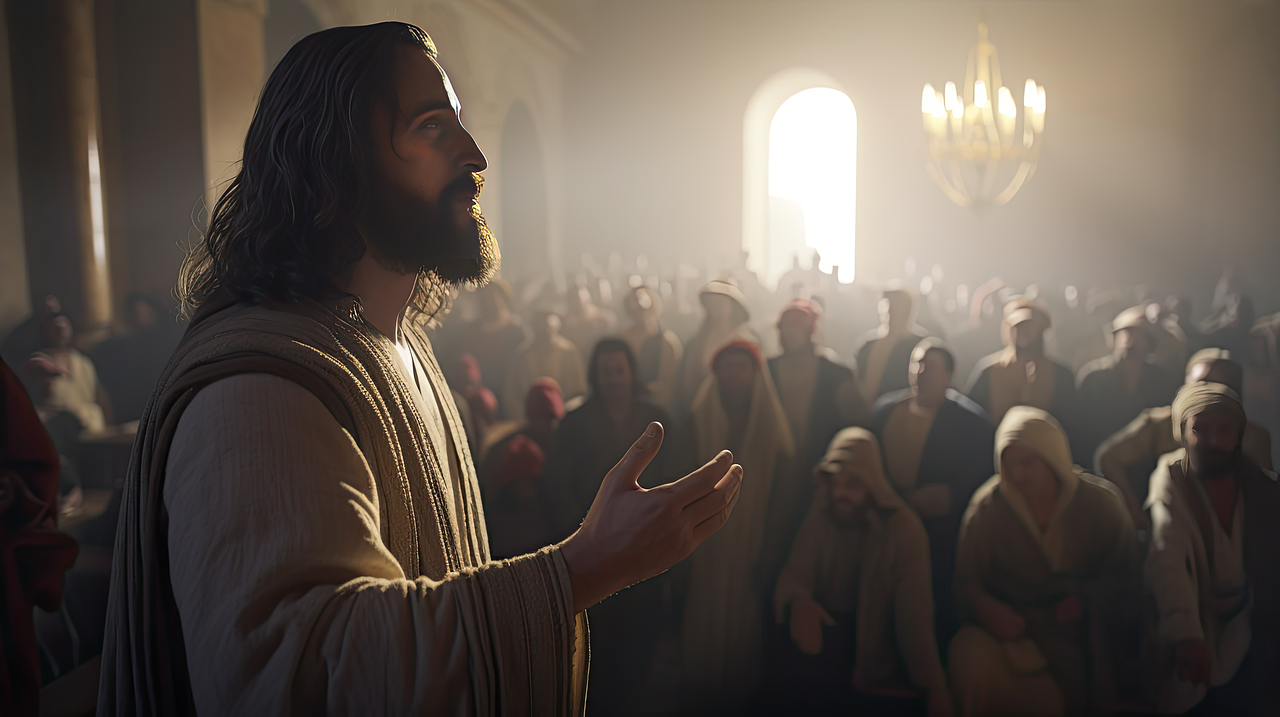The Fulfillment of Gods Covenant: Jeremiah 34, Freedom, and Justice in Jesus Christ
An exploration of Jeremiah 34 and its context, highlighting the themes of covenant, freedom, and the call to uphold justice, and how they are fulfilled by Jesus Christ in the New Covenant.

Photo by Luca Dimola on Unsplash | Commercial use allowed
Overview of Jeremiah 34 and Its Context
During Jeremiah’s ministry, the kingdom of Judah faced a pivotal moment for repentance, underscoring the significance of Jeremiah 34 in the biblical narrative. Jeremiah, as a prophet, was tasked with calling the people of Judah to repentance and sincere worship, urging them to turn back to God in humility and genuine devotion. This period in the history of Judah, leading up to the kingdom’s eventual fall in 586 BC, serves as a backdrop for the exploration of profound theological themes such as repentance, restoration, and the enduring covenant between God and Israel.
One example that illustrates the gravity of this context is the impending fall of the kingdom of Judah, which adds a sense of urgency to Jeremiah’s message of repentance and restoration. The impending doom of the kingdom creates a poignant backdrop for Jeremiah’s prophetic call, emphasizing the need for the people of Judah to realign themselves with God’s will. It sets the stage for a deeper understanding of the theological implications of the covenant, freedom, and justice, which are central themes in Jeremiah 34.
This pivotal context also serves to highlight the profound spiritual and historical significance of Jeremiah’s ministry, offering valuable insights into the evolving relationship between God and His people. As such, the themes and events in Jeremiah 34 lay the groundwork for a comprehensive examination of the covenant, freedom, and justice as they relate to the broader biblical narrative and the fulfillment of these themes in the teachings and ministry of Jesus Christ.
#Jeremiah34, #Covenant, #Freedom, #Justice, #JesusChrist, #MoralObligation, #Equality, #BiblicalNarrative, #Commitment, #Christianity, #OldTestament, #SocialJustice, #Ethics, #Compassion, #HonoringAgreements, #Fairness, #Oppression, #MoralResponsibility, #CalltoJustice
Additionally, understanding the historical and cultural context of Jeremiah’s ministry provides a lens through which the theological themes of the book can be comprehensively explored. Jeremiah’s prophetic ministry occurred during a critical juncture in the history of Judah, as the nation stood on the brink of destruction due to its persistent disobedience and idolatry. This historical context underscores the urgency of Jeremiah’s message and the relevance of the theological themes addressed in Jeremiah 34 to the prevailing societal and spiritual challenges of that time. Therefore, delving into the historical and cultural backdrop of Jeremiah’s ministry enriches the understanding of the theological implications centered around the covenant, freedom, and justice as portrayed in Jeremiah 34.
Significance of Covenant in Biblical Context
The significance of the covenant in the biblical context goes beyond a mere agreement between God and His people. It symbolizes God’s unwavering commitment to extending salvation to all humanity. Throughout the Old Testament, the covenant is portrayed as a divine promise that reflects God’s enduring love and mercy towards His creation. An illustrative example is the covenant made with Abraham, where God promised to bless all the nations of the earth through his descendants. This covenantal promise was a precursor to the ultimate fulfillment found in the New Covenant through Jesus Christ.
The New Covenant represents a profound spiritual transformation for both individuals and the broader Jewish community. It offers promises that far surpass those of the previous covenant, emphasizing eternal life and the forgiveness of sins through the atoning sacrifice of Jesus Christ. This shift from the Old Covenant to the New Covenant exemplifies God’s continuous work to re-establish a deep and personal relationship with humanity. The covenantal aspect of God’s love and grace is vividly portrayed in the book of Jeremiah, particularly in the context of the New Covenant, where God promises to inscribe His law on the hearts of His people, signifying a transformative internal renewal. This covenantal renewal is a testament to God’s unchanging love and His desire for an everlasting bond with His creation.
Furthermore, understanding the biblical concept of covenant within the broader theological framework illuminates the depth of God’s commitment to His people throughout salvation history. The covenantal relationship between God and humanity serves as a foundational theme that underscores the divine initiative in establishing and maintaining a bond with His creation. This theological concept not only portrays God’s faithfulness and love but also emphasizes the transformative nature of the covenants, particularly the New Covenant, which brings about a spiritual renewal and eternal promises through the redemptive work of Jesus Christ. Therefore, exploring the significance of the covenant in the biblical context unveils the profound implications of God’s enduring commitment to humanity’s salvation and restoration through the fulfillment of the covenants in Christ.
Exploring the Theme of Freedom in the Bible
The theme of freedom in the Bible is profoundly significant, permeating various narratives and theological teachings. One notable example of freedom in the Old Testament is the liberation of the Israelites from slavery in Egypt, illustrating God’s active role in delivering His people from bondage. This historical event serves as a powerful demonstration of God’s commitment to the freedom and well-being of His chosen people. Moreover, the freedom from physical enslavement also symbolizes the spiritual liberation that God offers to humanity through His redemptive plan.
In the New Testament, Jesus Christ’s teachings and actions further underscore the theme of freedom. His ministry emphasized the deliverance from sin and spiritual oppression, offering a pathway to reconciliation and freedom for those who believe in Him. For instance, Jesus proclaimed, “So if the Son sets you free, you will be free indeed” (John 8:36, New International Version). This proclamation encapsulates the essence of freedom as an integral aspect of the Christian faith, highlighting the transformative power of Christ’s redemption.
Furthermore, the theme of freedom is intricately interwoven with the concept of the New Covenant. The New Covenant represents God’s ultimate act of liberating humanity from the bondage of sin, providing eternal freedom and restoration of the divine-human relationship. This spiritual liberation aligns with the Old Testament prophecies of a future covenant that would bring about genuine freedom and transformation for God’s people. Therefore, the theme of freedom in the biblical narrative serves as a testament to God’s unwavering commitment to the liberation and spiritual flourishing of humanity, culminating in the redemptive work of Jesus Christ.
Moreover, the theme of freedom extends beyond individual salvation to encompass the broader scope of societal and communal liberation. Jesus Christ’s ministry not only addressed the spiritual freedom of individuals but also challenged social injustices and systemic oppression, exemplifying the holistic nature of freedom within the Christian worldview. His teachings and actions underscored the interconnectedness between personal liberation and the pursuit of justice and equality for all members of society. Thus, the theme of freedom in the Bible captures the multifaceted dimensions of God’s redemptive plan, encompassing spiritual, social, and communal liberation through the transformative power of Jesus Christ.
The Call to Uphold Justice in Jeremiah 34
Jeremiah 34, within the broader context of the book of Jeremiah, presents a powerful call to uphold justice. This call is not merely a suggestion but an imperative for the people of Judah to actively engage in the pursuit of justice, particularly for the marginalized and oppressed members of society. The specific mention of the marginalized and oppressed indicates a divine concern for those who are often overlooked or mistreated within the social fabric of the community. This underscores the biblical understanding that justice is not just a lofty ideal but a practical and tangible expression of God’s care for His creation.
One powerful example of this call to justice can be found in Jeremiah 34:17, where it depicts the consequences of failing to uphold justice. The verse highlights the consequences of breaking a covenant, emphasizing the importance of justice within the context of divine covenants. This serves as a powerful reminder of the interconnectedness between justice and the broader theological framework presented in the book of Jeremiah. It demonstrates that the call to uphold justice is not just a cultural or societal expectation, but a deeply theological and spiritual imperative.
Moreover, the call to uphold justice in Jeremiah 34 is not merely about retribution but about restoration. It reflects a divine desire for the restoration of not just individuals, but of the entire community. The call to justice is intrinsically linked to the themes of repentance and restoration within the book of Jeremiah, emphasizing the interconnectedness of these theological concepts. This interconnectedness serves as a reminder that justice is not merely about punishment, but about the holistic transformation and healing of a community.
Furthermore, understanding the call to uphold justice as depicted in Jeremiah 34 provides a theological framework for addressing contemporary issues of social justice and equity. By examining the biblical imperative to uphold justice for the marginalized and oppressed, individuals and communities are compelled to actively engage in promoting fairness, equality, and compassion within their societal contexts. This theological underpinning offers a powerful lens through which modern-day challenges of injustice and inequity can be understood and addressed, aligning with the biblical mandate to pursue justice for all members of society. Therefore, the call to uphold justice in Jeremiah 34 carries profound implications for the ethical and moral imperatives of believers to actively participate in the pursuit of justice and equity in their communities, echoing the divine concern for the well-being of all individuals.
Jesus Christ’s Fulfillment of the Call to Uphold Justice
Jesus Christ’s fulfillment of the call to uphold justice, as depicted in Jeremiah 34, is evident not only in His teachings but also in His actions during His ministry on earth. For instance, in the Gospel of Luke, Jesus declares His mission by quoting the prophet Isaiah, stating that He has come to “proclaim freedom for the prisoners and recovery of sight for the blind, to set the oppressed free”. This aligns directly with the call to uphold justice, as it reflects His deep concern for the marginalized and oppressed, fulfilling the prophetic message of liberation.
Moreover, Jesus’ ministry exemplifies the fulfillment of Old Testament prophecies, especially those related to the restoration of justice and righteousness. The book of Isaiah, for example, contains numerous prophecies about the coming Messiah who will bring justice to the nations and establish righteousness on earth. Jesus’ life and teachings directly fulfill these prophecies, as He embodies the principles of justice, compassion, and equity in His interactions with people from all walks of life. His commitment to uplifting the downtrodden and advocating for the disenfranchised echoes the call to uphold justice as expressed in Jeremiah 34.
Additionally, Jesus Christ’s role as the permanent High Priest is significant in understanding His fulfillment of the call to uphold justice. In the New Testament book of Hebrews, Jesus is described as the ultimate High Priest who intercedes for His people and advocates for their well-being before God. This representation underscores His unwavering commitment to upholding justice and righteousness for humanity, as He stands as the bridge between God and humanity, ensuring that justice is served and mercy is extended to those in need. Therefore, Jesus Christ’s life, teachings, and ultimate sacrifice embody the fulfillment of the call to uphold justice as delineated in Jeremiah 34.
Furthermore, the fulfillment of the call to uphold justice through the ministry and sacrificial work of Jesus Christ extends to the redemptive impact on the broader scope of human history. His teachings and actions not only addressed the immediate societal injustices of His time but also established a foundational framework for addressing systemic inequities and promoting social justice across generations. The transformative influence of Jesus Christ’s ministry continues to resonate in the advocacy for justice, compassion, and equality, inspiring individuals and communities to pursue the call to uphold justice as an integral part of their faith and ethical responsibility. Therefore, the fulfillment of the call to uphold justice in Jesus Christ not only encapsulates His earthly ministry but also serves as a timeless model for championing justice and righteousness in every facet of human society.
 Theological Implications of Jeremiah 34 in Relation to Jesus Christ
Theological Implications of Jeremiah 34 in Relation to Jesus Christ
The theological implications of Jeremiah 34 in relation to Jesus Christ extend to the fulfillment of Old Testament prophecies. Jeremiah 34 emphasizes the call to uphold justice and addresses the needs of the marginalized and oppressed, reflecting God’s expectation for His people to actively work towards human flourishing and societal well-being. This resonates with Jesus Christ’s teachings and actions, which align with the call to uphold justice in Jeremiah 34, reflecting His concern for the oppressed and marginalized. For instance, in the New Testament, Jesus emphasized the importance of caring for the vulnerable and marginalized, advocating for justice and compassion as integral parts of the Kingdom of God. His ministry exemplifies the fulfillment of Old Testament prophecies, bringing about liberation and justice for all.
Furthermore, the transformative impact of Jesus Christ on the theological themes of freedom, justice, and covenant fulfillment has significant doctrinal implications for Christian theology. His role in bringing about liberation and fulfilling the call to justice underscores the core tenets of the Christian faith, emphasizing the restoration of the broken, the liberation of the oppressed, and the realization of God’s justice on earth as it is in heaven. Jesus Christ’s teachings and actions provide a framework for Christians to actively engage in upholding justice, demonstrating compassion, and working towards the well-being of society. Therefore, the theological implications of Jeremiah 34 in relation to Jesus Christ not only affirm the prophetic fulfillment in Christ but also underscore the ethical and moral imperatives for believers to actively participate in the pursuit of justice and liberation for all.
Moreover, the theological implications of Jeremiah 34 in relation to Jesus Christ extend to the doctrinal understanding of the New Covenant and its transformative impact on the human condition. The fulfillment of the call to uphold justice in Jesus Christ not only signifies His role as the embodiment of divine justice and mercy but also establishes a redemptive paradigm for addressing the systemic injustices and societal inequities prevalent in human societies. His teachings and actions serve as a theological anchor for advocating for justice and righteousness, inspiring believers to actively engage in promoting social well-being and advocating for the rights of the marginalized and oppressed. Therefore, the theological implications of Jeremiah 34 in relation to Jesus Christ resound in the ethical and moral imperatives for believers to emulate Christ’s commitment to upholding justice and compassion, thereby contributing to the establishment of a more just and equitable society.
The New Covenant in Jeremiah: A Jewish Perspective
The new covenant in Jeremiah is a concept deeply rooted in Jewish theology, signifying a pivotal promise from God to the Jewish people. This covenant is regarded as a future event that carries profound implications for spiritual and collective transformation, igniting extensive discussions and debates among scholars and religious leaders within the Jewish community. It represents a renewal of the relationship between God and the Jewish people, carrying the potential for spiritual and communal metamorphosis, thereby shaping the theological landscape of Judaism.
In Jewish thought, the new covenant in Jeremiah embodies the hope for a renewed and reinvigorated bond between the Jewish people and their divine Creator. This renewal is seen as not only a spiritual transformation for individuals but also as a collective metamorphosis for the Jewish community as a whole. The prospect of this covenant has been a subject of theological contemplation and dialogue, with varying interpretations seeking to elucidate its profound implications for Jewish faith and practice. Furthermore, the new covenant’s significance is underscored by its role in shaping the eschatological expectations and the theological underpinnings of the Jewish tradition, making it a subject of profound interest and inquiry within Jewish scholarship and religious discourse.
Moreover, the new covenant in Jeremiah from a Jewish perspective engenders profound theological reflections on the enduring bond between God and the Jewish people. The promise of a new covenant represents a transformative shift in the divine-human relationship, offering a renewed hope and expectation for spiritual renewal and collective reconciliation. The theological significance of the new covenant within Jewish thought underscores the enduring impact of this divine promise on the religious identity and communal aspirations of the Jewish people, shaping their eschatological hopes and theological reflections on the redemptive future. Therefore, the new covenant in Jeremiah from a Jewish perspective not only embodies a theological promise but also serves as a foundational cornerstone for the spiritual and communal transformation of the Jewish faith and tradition.
 Transformation of the Heart and Eternal Life
Transformation of the Heart and Eternal Life
The concept of the New Covenant in Jeremiah introduces a profound transformation of the heart and the promise of eternal life through the sacrificial act of Jesus Christ. This transformative covenant signifies a pivotal shift in God’s plan for humanity, offering eternal forgiveness and a spiritual metamorphosis. By inscribing the spirit or intent of the law in the hearts of those who receive the Holy Spirit, the New Covenant brings about a profound internal change, aligning individuals with God’s will and purpose.
An illustrative example of this transformation can be found in the teachings of Jesus Christ, where he emphasizes the importance of spiritual rebirth and the renewal of the inner self. In the Gospel of John, Jesus discusses the concept of being “born again” as a spiritual rebirth, highlighting the transformative nature of the New Covenant in shaping the hearts and lives of believers. This spiritual renewal is intricately linked to the promise of eternal life, demonstrating the enduring impact of the New Covenant on the destiny of individuals who receive it.
Furthermore, the New Covenant’s emphasis on the transformation of the heart and the attainment of eternal life underscores God’s overarching plan for humanity. Through the sacrifice of Jesus Christ, the covenant offers a path to spiritual renewal and the fulfillment of God’s redemptive purpose for His people. This transformative aspect of the New Covenant not only reflects God’s unchanging love and grace but also signifies a profound shift in the relationship between God and humanity, ushering in an era of eternal promises and spiritual metamorphosis.
Additionally, the transformative impact of the New Covenant on the human heart and the promise of eternal life resonates in the theological reflections of believers and Christian communities. The inward transformation brought about by the New Covenant not only signifies a personal renewal but also embodies a communal and eschatological hope for the ultimate redemption and restoration of all creation. The theological significance of the New Covenant extends to the enduring impact of its promises, inspiring believers to embrace the transformative power of Christ’s sacrifice and the eternal hope embedded within the covenantal relationship with God. Therefore, the New Covenant’s emphasis on the transformation of the heart and the promise of eternal life serves as a theological anchor for the spiritual metamorphosis of individuals and communities, offering a pathway to redemption and the realization of God’s redemptive plan for humanity.
 The Old and New Covenants: A Comparative Analysis
The Old and New Covenants: A Comparative Analysis
A comparative analysis of the Old and New Covenants provides a deeper understanding of the evolution of God’s relationship with humanity. The Old Covenant, established with ancient Israel, laid the foundation for the New Covenant, which brought about a transformative shift in God’s interaction with His people. Through the Old Covenant, God revealed His desire to establish a covenantal relationship with humanity, offering guidance, protection, and the promise of salvation.
The Old Covenant was characterized by the Mosaic Law and the sacrificial system, which served as a temporary measure to atone for sin and guide the Israelites in their relationship with God. However, the New Covenant, inaugurated through the sacrifice of Jesus Christ, brought about a profound transformation in the way humanity could experience God’s salvation and grace. This evolution reflects God’s unwavering commitment to offer redemption and eternal life to all peoples, transcending the boundaries of nationality or ethnicity [1, 4].
Moreover, the comparative analysis of the Old and New Covenants not only underscores the progressive nature of God’s redemptive plan but also highlights the enduring impact of the covenants on the spiritual and communal life of believers. The Old Covenant laid the foundation for understanding God’s character and redemptive promises, whereas the New Covenant brought about a radical transformation in the way humanity could experience God’s salvation and grace. Therefore, the comparative analysis of the Old and New Covenants serves as a theological continuum, elucidating the progressive revelation of God’s redemptive plan and the enduring impact of the covenants on the spiritual journey of believers throughout salvation history.
Moreover, the comparative analysis of the Old and New Covenants offers profound insights into the theological continuity and progression of God’s redemptive plan for humanity. The Old Covenant, with its emphasis on the Mosaic Law and sacrificial system, provided a foundational framework for understanding

 Theological Implications of Jeremiah 34 in Relation to Jesus Christ
Theological Implications of Jeremiah 34 in Relation to Jesus Christ Transformation of the Heart and Eternal Life
Transformation of the Heart and Eternal Life The Old and New Covenants: A Comparative Analysis
The Old and New Covenants: A Comparative Analysis
